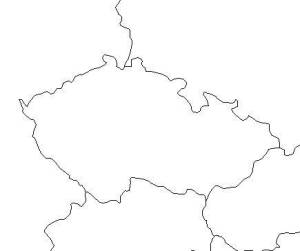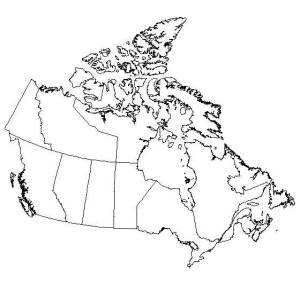This special article in honour of Canada Day (July 1) is by my older daughter, Allison Hunter-Frederick.
In 1992, I wrote an article for our family’s newsletter about my two grandmothers, neither of whom was originally from Canada. As I reread the thoughts now that they shared with me, their pride in their new country rings strong, but I’m most struck by how relevant the differences in their viewpoints about whether to hold onto or let go of their heritage are to me today.
 My Nanny Hunter lived in Czechoslovakia until she was eight years old, while my Nanny Burry was born in Newfoundland at a time before it had joined the rest of Canada. Even into my adulthood, both my grandmothers have told me stories of the lands of their birth but also have emphasized how glad they are to be Canadian.
My Nanny Hunter lived in Czechoslovakia until she was eight years old, while my Nanny Burry was born in Newfoundland at a time before it had joined the rest of Canada. Even into my adulthood, both my grandmothers have told me stories of the lands of their birth but also have emphasized how glad they are to be Canadian.
When my Nanny Hunter (then Mary Tanchack) was only five years old, her father left the family to move to Canada. He wanted to find a life better than the one they had as part of the poor in Czechoslovakia, where the family had lived off the land, eating what could grow. Most of the time, this meant potatoes and vegetables. Twice a year, at Christmas and Easter, they would have meat too. White bread was also a luxury as the family normally ate rye bread, which was made from their crops. Their house was a small thatched-roof building with a curtain dividing the inside rooms. The family lived within these rooms. Her father found conditions much improved in Canada and so that is why when my nan was eight the whole family moved to Canada.
The family made a promise to leave their traditions behind in the “old country”. Canada was their home now and so they would live as Canadians. My nan’s father worked on farms and also found a job with highway construction when the Queen Elizabeth Road (between Toronto and Niagara Falls) was built. They moved in with another family in a house in Toronto. True to their promise, they learned English (although this was difficult) and Canadian customs.
 My Nanny Burry faced a similar situation growing up as a girl in the central part of Newfoundland. The standard of living for her family was also low, with no great wage earnings for her father. They too ate potatoes and vegetables from the garden. Their meat came from chickens in the yard killed for a special occasion. Food was rarely brought from a store; instead the family made their own bread and even their own ice-cream.
My Nanny Burry faced a similar situation growing up as a girl in the central part of Newfoundland. The standard of living for her family was also low, with no great wage earnings for her father. They too ate potatoes and vegetables from the garden. Their meat came from chickens in the yard killed for a special occasion. Food was rarely brought from a store; instead the family made their own bread and even their own ice-cream.
Unlike my Nanny Hunter, however, she didn’t move from her home country. In our interview she said that she had many childhood and adolescent memories of playing on swings and seesaws that families made themselves, attending concerts, marching in parade’s on the King’s birthday, and participating in the Salvation Army Girls. She also remembered being part of an old Christmas tradition in Newfoundland. Mummering is an event not held often today, where folks dress up in costumes and visit neighboring homes for snacks, music, and dance.
However, in 1947, under the leadership of Premier Joseph Smallwood, Newfoundland became part of Canada. My nan was part of the majority who voted to become part of Canada and told me during our interview that Newfoundland gained plenty in the years following Confederation. For one thing, the economy greatly improved. Roads were built, as were playgrounds, stadiums, and swimming pools. Water didn’t need to be drawn anymore from a hydrant. Residents stopped having to walk or rely on horse-and-buggy as their only means of transportation. They also started to receive unemployment checks and old age pension. Businesses increased too.
Neither of my grandmothers has ever regretted her decision to become a citizen of a new country, to become Canadian. My Nanny Hunter, who has spent most of her life in Canada, is very patriotic. As such, she feels disturbed by immigrants who refuse to relinquish the traditions from their “old country”. She feels that when they come to Canada to live they should leave their old ways behind.
My Nanny Hunter is proud of our Canadian heritage, which includes things as simple as the uniform of the Royal Canadian Mounted Police and as complex as the Canadian Constitution which guarantees religious freedom. Her family came from a Greek Orthodox country, where most people were required to be Greek Orthodox. In Czechoslovakia, when she became a Protestant Christian, not only was she excommunicated but also she was not allowed to attend school. When her family moved to Canada, she started going to school again.
When my Nanny Hunter was eight years old and coming to Canada by boat, she never dreamed that years later she’d have the opportunity to travel from coast-to-coast, including to Newfoundland. She’s proud of the United Christian Canada to which she moved as a girl and remains proud to this day to be a Canadian citizen.
My Nanny Burry also remained loyal to Canada to her death. However, in our interview, she admitted to missing some of Newfoundland’s old ways, ones that were being lost or forgotten even in her day, which made the province “a distinct society”. My nan expressed regret that in the process to acquiring a better life, Newfoundlanders were drifting apart from one other and growing more hurried in their lifestyles. There used to be a time when everyone in town knew everyone else. Despite many gains, she felt there had also been many losses. The removal of old buildings has resulted in the destruction of landmarks. One can no longer hear the whistle of the train, for trucks have replaced trains. The mainstay of the economy, the fishery, has collapsed due to careless supervision by Central Canada. All of these changes and more, including the conversion of small-town offices into super mailboxes, have been witnessed by both my Nanny Burry and me.
At the start of this article, I wrote that in my interviews with my grandparents, I felt most struck by how relevant the differences in their viewpoints about whether to hold onto or let go of their heritage are to me today. One reason I have already alluded to, which is that I have lived long enough to see some of the ways of my hometown succumb to change that is brought on by economic needs. Another is that now I see my province only on visits, which means the features that most make it distinct are the ones which I most fight to see stay. In reality though, both of these may have less to do with the decision by Newfoundlanders to become part of Canada and more to do with the tides of change which everyone faces whether they leave their country, become part of a new one, or remain of the same nationality.
A third reason then is because as an American teacher, I often work with students who have moved here from countries from all over the world. Some of them wish to return to their homeland, others want to share and hold onto their traditions, and others have all but distanced themselves from their culture. In one school where I worked, our English Language Learners held a celebration day where their parents brought in foods traditional to their homeland. In another school, a student struggled daily because he was the only Mexican in class and he missed the life he once knew. In a third school, students enjoyed stories with their peers about their unique traditions. I loved the diversity but also realize that to varying degrees all of these students were also embracing American ways.
A final reason is that in 1998, I moved from a small town in Canada to a much bigger town in the United States. Although I hated the big buildings and frequent sirens which greeted me, features of a big town, I otherwise felt eager to acclimate myself to my new country. Obviously, there weren’t many changes, especially in contrast to those my Nanny Hunter would have faced coming from Czechoslovakia. In fact, at first the changes were so unnoticeable, I didn’t miss much about my old life. Slowly though, I began to realize that I pronounced some words differently and could purchase certain foods only in Canada. I also discovered that I feel most comfortable near trees, ponds, hills, and mountain, of all which I can find it much greater abundance in my hometown. Oh, and the political system is different, the medical system is different…. As much as Canada and the United States are alike, they also have many ways in which they aren’t the same. While some of them I obviously don’t have any control over, there are ones which I do. And so every year I bring back tangible reminders from Canada, including handfuls of books about my home province. I also feel pleased when a person I first meet says I have an accent.
My husband and I have chosen to live in the United States, which is his country of birth. This is now my home and I am proud of it. However, when I eventually apply for American citizenship, I don’t intend to relinquish my Canadian status. I’m equally as proud to be Canadian. As my grandmothers would agree, Canada is the perfect place to live.
Next week I’ll post an update on the comments that I made on books opposing open theism in my initial “Some Books on Open Theism” post.

Interesting article Allison!
Thanks, Allison, for allowing me to post “Canada — A New Homeland” at Open Theism. I really appreciate your not only updating the account of your grandmothers’ lives before they became Canadians and of their feelings about Canada that appeared in our summer 1992 family newsletter but also your sharing how their different viewpoints are relevant to you today.
I’m praying that Andy and you have a safe journey from Nebraska to Newfoundland and enjoy your visit to the Northern Peninsula and to us. We’re looking forward to your visit.
Thanks, Dad, for inviting me to prepare a guest post for your blog to celebrate Canada Day. I enjoyed revisiting the information about my grandmothers and updating the article to reflect my current views. See you in about a week!
Nice!
Thanks Rodney and MC for your praise of my article. I’m glad you enjoyed it!
Pingback: Freedom | Allison's Book Bag